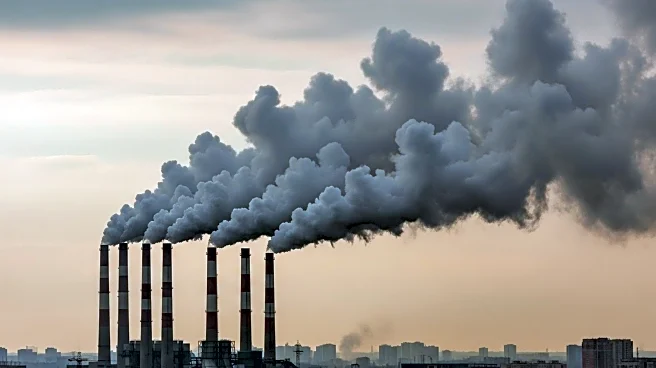What is the story about?
What's Happening?
Recent research published in the journal Nature has linked emissions from the world's largest fossil fuel and cement companies to the intensification of heat waves globally. The study analyzed over 200 heat waves since the year 2000, attributing about half of the increase in their intensity to emissions from 180 major carbon emitters. Notably, 14 of these companies, including Exxon Mobil Corp., Saudi Aramco, and Gazprom PJSC, were found to have significantly contributed to more than 50 heat waves that would have been nearly impossible without human-induced global warming. The study highlights the role of these companies in exacerbating extreme weather events, which have led to severe social and economic disruptions.
Why It's Important?
The findings underscore the growing accountability of major carbon emitters in climate change-related phenomena, such as heat waves. This research could bolster climate lawsuits against polluters, as it provides scientific evidence linking specific companies to environmental harm. The intensification of heat waves poses significant risks, including increased health hazards, damage to infrastructure, and reduced productivity. As climate change continues to make heat waves more frequent and severe, the study's insights could influence public policy and corporate responsibility, potentially leading to stricter regulations and increased pressure on companies to reduce emissions.
What's Next?
The study's implications may lead to heightened legal and public scrutiny of major carbon emitters. As climate attribution research advances, it could pave the way for more successful litigation against polluters, holding them accountable for their contributions to climate change. Additionally, the findings may prompt governments and international bodies to implement more stringent environmental policies and encourage companies to adopt sustainable practices. The ongoing dialogue around climate change and corporate responsibility is likely to intensify, with potential impacts on global economic and environmental strategies.
Beyond the Headlines
The research highlights the ethical and legal dimensions of climate change accountability. As scientific evidence increasingly links specific companies to environmental damage, the debate over corporate responsibility and climate justice gains momentum. This could lead to a shift in how societies view the role of businesses in environmental stewardship, potentially influencing cultural attitudes towards sustainability and corporate ethics.















